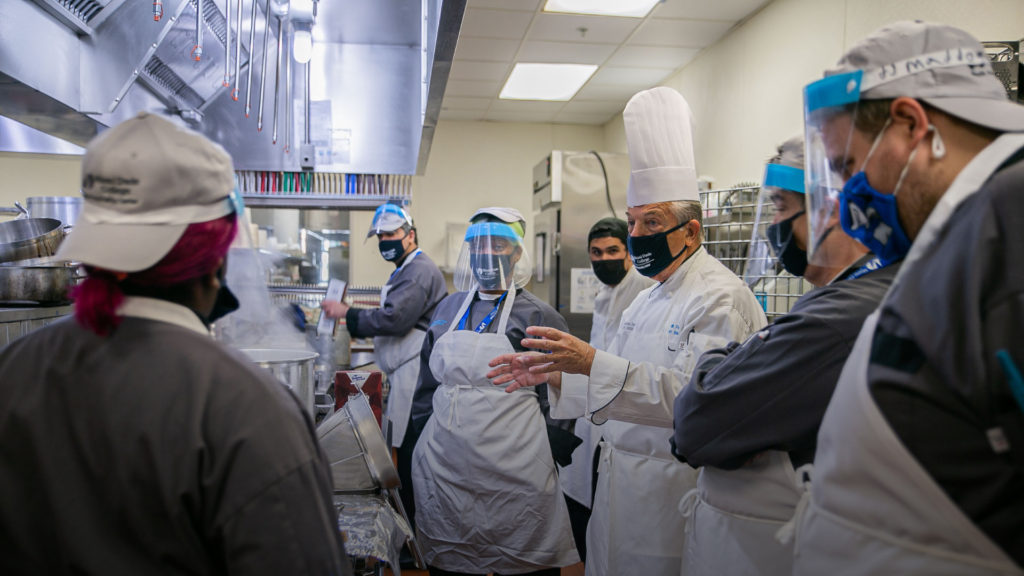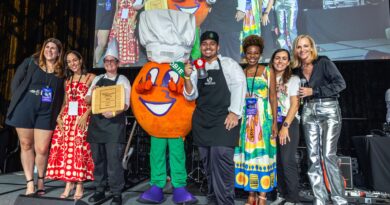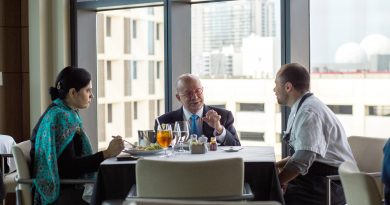Kitchen-Cook Training Program Prepares Homeless For Culinary Careers
Zachary Osman felt helpless after his 15 year marriage ended when he was 43. He said he self-medicated with marijuana and crack, lost his house and job as an irrigation engineer, and went to jail four times on drug related charges.
With no family in Florida, Osman couch-surfed at friends’ homes and slept in abandoned houses in Broward and Miami-Dade County. For six months in 2017, he parked his Toyota Tundra pickup truck near known drug areas to sleep and feed his addiction.
“There was something missing from my life,” Osman said. “I was moving jobs and there was a break period in between where I reassessed my life and I wasn’t happy. It wasn’t an outside thing. It was internal.”
Following a court order in 2019, Osman entered the veterans program at Camillus House that provides temporary housing to homeless people. He knew it was time to turn his life around.
The 51-year-old joined the Kitchen-Cook Employment Training Program at Camillus House—a partnership with the Miami Dade College Hospitality Institute—to learn the basics of working in a restaurant.
“I’m very grateful,” Osman said. “I wake up, and even after all that, I have a roof over my head and a place to sleep and a system that does its part as long as I do mine.”
The program, created in January of 2019, helps homeless people get off the streets and into jobs in the culinary field. As part of the curriculum, they learn life skills (how to apply for jobs and deal with conflict) and get hands-on kitchen experience such as preparing meals, cutting meat and preparing sauces.
Seven classes—about 90 students total—have graduated from the program. The most recent cohort started on Feb. 10.
Initially, the program lasted eight weeks and included groups of 14-15 students who met five times a week in the classroom and the kitchen. It was cut a week short and class sizes were reduced to eight to 10 students after the pandemic.

The classes are held virtually via Zoom four days a week. Students receive lectures from chef Frank Ferrara, who has been teaching at MDC for more than 10 years, on topics such as the basics of kitchen safety and how to chop chicken or cook fish and beef.
They also receive industry-related workforce readiness skills and customer service training from Hospitality Institute instructors Vanessa Violi and Herminia Herrera.
Every Wednesday, the students cook in the demonstration kitchen at MDC’s Culinary Institute under the watchful eye of Ferrara.
“We want them to be able to get the job, keep the job and get promoted,” Ferrara said.
Upon graduation, students earn a certificate of completion from MDC. They also receive a SafeStaff Training certificate—focused on food safety and sanitation—that is required for handling food in Florida.
Students who want to continue at MDC after finishing the training program can earn up to six college credits toward an associate’s degree in culinary management if they pass the required exams.
“This is a great program to get off the ground,” said Hilda Fernandez, who serves as CEO of Camillus House. “[It] allows someone to obtain a job that earns real good money and gives them housing.”
The program, supplies and uniforms are funded by Careersource South FL and Southeast Overtown Park West Community Redevelopment Agency.
To recruit students, Camillus House circulates information about the program to case managers at the facility. In addition, MDC hosts informational sessions.
Keeping the program alive during the pandemic has been difficult, but Camillus House never thought about shutting it down.
“We knew that once the community started to reopen, [they would need] people prepared to go into a field,” Fernandez said. “You can’t provide someone food virtually. You have to have someone on-site.”
Students say the program has been uplifting and eye-opening.
“It’s a program that inspires us to do better,” said Lamont Wilcox, 55. “[It teaches us that] no matter how old we are, we can do anything in life if we put our minds to it.”
They gain cooking and hospitality skills and interpersonal skills such as dealing and interacting with people on a daily basis.
“I’m getting a lot more than just cooking,” said Osman, who hopes to work as a prep cook at a steakhouse. “We learn about mindfulness and [participate in] breathing exercises. Those are things that are important in the kitchen because it can get stressful.”
After completing the program, Camillus House helps students find jobs through their contacts at locations like Marlins Park, the hospitality company Marriott International, Michael’s Genuine restaurants and cruise lines. According to Fernandez, the job placement rate after graduation is more than 70 percent. Pay in these jobs ranges from $12 to $18 an hour.
“What we do at MDC is provide opportunities,” said Shelly Fano, chair of MDC’s culinary and hospitality programs. “We’ve been very fortunate to be able to train folks that are under-represented and to be able to match them with jobs so that it brings a change in their lives.”





